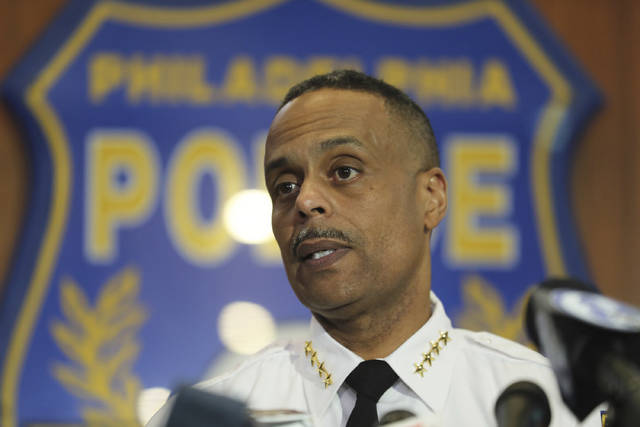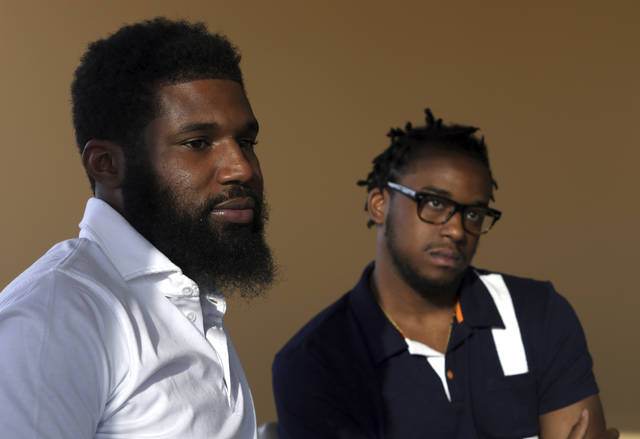PHILADELPHIA — Rashon Nelson initially brushed it off when the Starbucks manager told him he couldn’t use the restroom because he wasn’t a paying customer.
He thought nothing of it when he and his childhood friend and business partner, Donte Robinson, were approached at their table and were asked if they needed help. The 23-year-old entrepreneurs declined, explaining they were just waiting for a business meeting.
A few minutes later, they hardly noticed when the police came into the coffee shop — until officers started walking in their direction.
“That’s when we knew she called the police on us,” Nelson told The Associated Press in the first interview by the two black men since video of their trespassing arrests April 12 touched off a furor around the U.S. over racial profiling, or what has been dubbed “retail racism” or “shopping while black.”
Nelson and Robinson were led away in handcuffs from the shop in the city’s well-to-do Rittenhouse Square neighborhood in an incident recorded on a white customer’s cellphone.
In the week since, the men have met with Starbucks’ apologetic CEO and have started pushing for lasting change at the coffee-shop chain, including new policies on discrimination and ejecting customers.
“We do want to make sure it doesn’t happen to anybody again,” Robinson said. “What if it wasn’t us sitting there? What if it was the kid that didn’t know somebody that knew somebody? Do they make it to jail? Do they die? What happens?”
On Thursday, they also got an apology from Philadelphia Police Commissioner Richard Ross, a black man who at first staunchly defended his officers’ handling of the incident.
“I should have said the officers acted within the scope of the law, and not that they didn’t do anything wrong,” Ross said. “Words are very important.”
At a news conference, a somber Ross said he “failed miserably” in addressing the arrests. He said that the issue of race is not lost on him and that he shouldn’t be the person making things worse. “Shame on me if, in any way, I’ve done that,” he said.
He also said the police department did not have a policy for dealing for such situations but does now, and it will be released soon.
Nelson and Robinson said they went to the Starbucks to meet Andrew Yaffe, a white local businessman, over a potential real estate opportunity. Three officers showed up not long after. Nelson said they weren’t questioned but were told to leave immediately.
Yaffe showed up as the men were being handcuffed and could be seen in the video demanding an explanation for the officers’ actions. Nelson and Robinson did not resist arrest.
“When you know that you did nothing wrong, how do you really react to it?” Nelson said. “You can either be ignorant or you can show some type of sophistication and act like you have class. That was the choice we had.”
It was not their first encounter with police. But neither had been arrested before, setting them apart from many of those they grew up with in their gritty southwest Philadelphia neighborhood.
Nelson and Robinson spent hours in a jail cell and were released after midnight, when the district attorney declined to prosecute them.
Nelson said he wondered if he’d make it home alive.
“Any time I’m encountered by cops, I can honestly say it’s a thought that runs through my mind,” Nelson said. “You never know what’s going to happen.”
Starbucks has said the coffee shop where the arrests occurred has a policy that restrooms are for paying customers only, but the company has no overall policy. The men’s attorney, Stewart Cohen, said they were illegally profiled.
The arrests prompted protests at the Starbucks and a national boycott. Kevin Johnson, CEO of the Seattle-based company, came to Philadelphia to meet with the men, called the arrests “reprehensible” and ordered more than 8,000 Starbucks stores closed on the afternoon of May 29 so that nearly 175,000 employees can receive training on unconscious bias.
Robinson said that he appreciates the public support but that anger and boycotting Starbucks are not the solution.
The men said they are looking for more lasting results and are in mediation with Starbucks to make changes, including the posting in stores of a customer bill of rights; the adoption of new policies on customer ejections and racial discrimination; and independent investigations of complaints.
“You go from being someone who’s just trying to be an entrepreneur, having your own dreams and aspirations, and then this happens,” Nelson said. “How do you handle it? Do you stand up? Do you fight? Do you sit down and just watch everyone else fight for you? Do you let it slide, like we let everything else slide with injustice?”
———
Whack is The Associated Press’ national writer for race and ethnicity. Follow her work on Twitter at http://www.twitter.com/emarvelous






